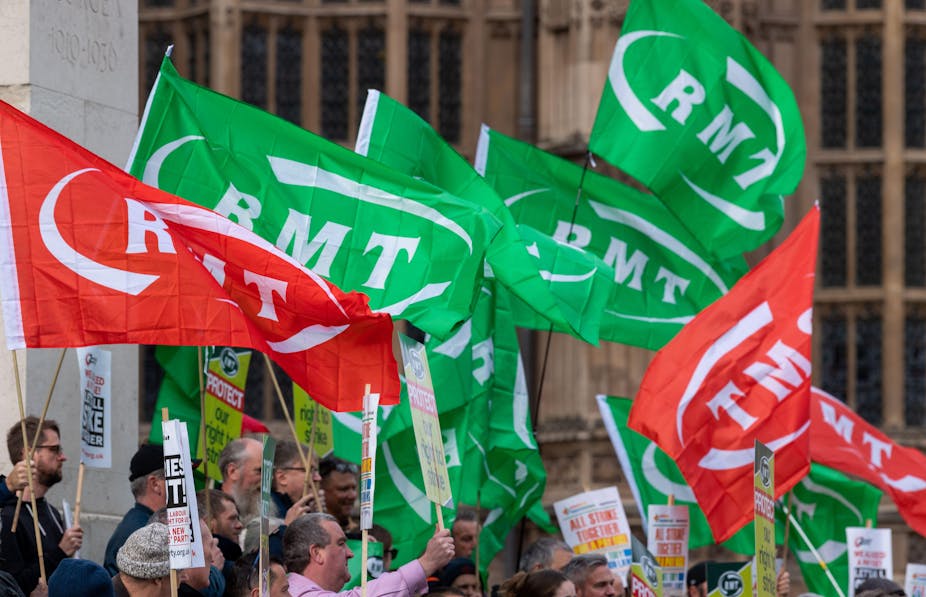The UK government is to hold an emergency planning meeting this week to prepare for the impact of strike action across multiple sectors including transport, healthcare, Royal Mail and many others. Relevant departments and their ministers will meet to discuss a response to the ongoing industrial action. Specifically, they are organising military personnel training on ambulance driving and drafting in civil servants to cover border force duties.
But union leaders – particularly the head of the Royal College of Nursing (RCN) Pat Cullen, whose members are due to strike on December 15 and 20 – are suggesting government ministers should be meeting with them rather than each other this week.
The National Union of Rail and Maritime Transportation Workers (RMT) has also been in negotiations with train companies, represented by industry body the Rail Delivery Group, over pay and conditions for much of this year. But a deal has not yet been struck.
Such negotiations are complex and important, especially in the light of ongoing pressures such as the cost of living crisis and the impacts of COVID and Brexit on the UK economy. Ultimately, the price of failing to reach a deal will be met by union workers and their families, investors and shareholders in the train companies, and the general public trying to go about their day to day lives.
Read more: Strikes: how do they work?
In the case of nursing unions, the government is the employer, but in the case of unions that represent other industries, such as railway workers, the government could also play a role in negotiations between companies and employee representatives. As researchers who study the process of bargaining and negotiation to figure out which strategies work, we think it is clear that the government must get involved in these negotiations as a mediator.
Who dares wins
It is normally the case in a negotiation that the biggest risk takers are the most powerful negotiators. Their bargaining power is higher the more comfortable they are with risk relative to the other negotiators. The problem here is that all of the concerned parties – the unions, employers and the government – seem to be comfortable with risk. This partly explains why they have failed to compromise enough to reach a deal yet.
The risks facing the concerned parties mostly relate to the adverse impact of continued industrial action on the public. For the government, it is the risk that public anger will show at the ballot box.
For unions, it is the risk of losing public support. This has been the undoing of previous industrial action in the UK such as the miners’ strikes of the 1980s.
And for employers, in this case train companies, the risk is that the public, as customers, will start to permanently alter their travel arrangements. The longer the strikes, the greater each of these risks become.
Read more: UK strikes: six milestones in the history of industrial action in Britain
The government has met with the RMT – transport secretary Mark Harper met with RMT general secretary Mick Lynch in November, for example – it has not intervened directly in the negotiations so far.
It should consider doing so now because the unions and employers still appear to be quite far apart in their respective positions. As such, a deal will likely only be struck through compromise.
Of course, the recent announcement of further rail worker strikes over the Christmas period, for example, could be interpreted as a threat or a tactic aimed at encouraging the government to intervene to avert the action and move the negotiations closer to a deal.

The government as mediator
By joining the negotiations as a mediator, the government could make a huge difference. It would not just mean having a relevant, key player in the negotiating room but, more importantly, it would send a credible signal to the unions, and especially their members, that the government is listening and that it cares. This would enhance the trust between the various parties and securing trust is key in any negotiation, if parties are to compromise and reach a deal.
As the mediator, the government should suggest possible ways forward, move the process along and help to get the negotiations over the line. At this stage of the dispute, asking a neutral person such as judge to act as the mediator will not be as effective. Only the government, represented by a senior minister such as the deputy prime minister, has the necessary gravitas and credibility to listen, consider and restore trust.

There are lots of examples of a third party (who may or may not have an interest) playing a critical role in securing a deal. Northern Ireland’s Good Friday agreement is a case in point. The United States special envoy George J. Mitchell chaired the talks that led to the historic agreement and a relatively peaceful 25-year period in the region. There is also evidence to show that mediation works.
Crucially, research shows that the third-party facilitator must be seen as an “honest broker” by the other two parties, that is invested only in securing a deal, and not perceived as siding with one or other position. The onus for achieving this lies squarely on the shoulders of the government, if it wants to avoid turning 2023 into another winter of discontent.

